Global Affairs: Behind the Scenes Untold Stories
Global affairs are full of untold stories. Did you know a new study on Canadian men’s health has a 05:441 airing time? These stories show the real power struggles, secret talks, and hidden plans that shape our world. From secret spy work to hidden diplomatic messages, real politics is often more exciting and surprising than what we see in the news.
In this article, we’ll show you the hidden side of global affairs. You’ll learn about the secret moves of world leaders, the dark money in politics, and the environmental secrets kept from us. Get ready to be amazed, informed, and maybe even a little shocked by the secrets of global politics.
Key Takeaways
- Explore the hidden world of international intelligence operations and covert programs that have shaped modern history
- Uncover the invisible forces of dark money influencing global politics and decision-making
- Delve into the classified diplomatic cables and back-channel negotiations that have changed the course of history
- Investigate the environmental cover-ups and corruption within international aid programs
- Discover the untold stories of cross-border security operations and the impact of global trade agreements
The Hidden World of International Intelligence Operations
The world of international intelligence is fascinating but not well-known. It involves secret operations and cyber espionage that change global events. The NSA’s secret codebreaking during the Cold War and today’s cyber espionage have greatly influenced our world2.
The NSA’s Secret Cold War Codebreaking Programs
The NSA was key in cracking Soviet codes during the Cold War. This gave the U.S. a big advantage in the global struggle. The NSA did more than just spy satellites and counterterrorism2. Their codebreaking helped shape history, giving leaders vital information for big decisions.
Covert Operations That Shaped Modern History
Secret operations have also shaped our world. The CIA helped overthrow governments, and special forces missions had big effects3. Books like “Charlie Wilson’s War” show how secret actions impact global politics and power.
The Rise of Cyber Espionage Networks
With the world going digital, intelligence has changed too. Cyber espionage is now a big part of it. Using data from social media and satellites is key for modern spying2. This change affects how we keep information safe and secure.
| Intelligence Agency | Country | Focus |
|---|---|---|
| Foreign Intelligence Service (SVR) | Russia | Foreign intelligence |
| Mossad | Israel | Foreign intelligence and counterterrorism |
| Ministry of State Security (MSS) | China | Counterintelligence and internal security |
| Federal Security Service (FSB) | Russia | Counterintelligence and internal security |
| Security Service (MI5) | United Kingdom | Counterintelligence and domestic security |
| Federal Bureau of Investigation (FBI) | United States | Law enforcement and counterintelligence |
| Security Service (SBU) | Ukraine | Counterintelligence and internal security |
| Security Intelligence Service (CSIS) | Canada | Counterintelligence and security intelligence |
The world of international intelligence is complex and always changing. It’s influenced by new tech, global rivalries, and the quest for advantage. As the world changes, the role of intelligence agencies will grow more important3.
“In a digital world, understanding U.S. intelligence is key. The move from old spying to using Google Earth for secrets is very important.”
Dark Money: The Invisible Forces Behind Global Politics
The world of politics is often influenced by hidden money. This money, known as “dark money,” is used to support political goals. It also works against democracy worldwide4.
The Koch brothers are a prime example. They have nearly $900 million to spend on politics4. Their money goes towards extreme libertarian views. They even think taxes are wrong4.
They fund groups that push for extreme ideas, like selling oneself into slavery4. This shows their big impact on global politics and organizations4.
But dark money isn’t just about the Kochs. Fossil fuel companies have also spent a lot, secretly5. They’ve worked to hide the truth about climate change for years5.
This hidden money has hurt our efforts to fight climate change5. We’ve lost a decade because of it5.
These hidden forces show us that real power is often unseen. We need to understand dark money’s role. This is key to making international politics more open and fair.
“The ideas of the ruling class are in every epoch the ruling ideas.” – Karl Marx
Global Affairs: Power Plays and Secret Diplomatic Channels
The world of global diplomacy is often shrouded in secrecy. Classified communications and behind-the-scenes negotiations shape world events. These secret actions have a big impact on the international stage.
Classified Diplomatic Cables and Their Impact
Diplomatic cables, often classified, give us a peek into international relations. They can expose sensitive information and strategic plans. In 2021, over 900 requests were made to downgrade or declassify intelligence for diplomatic purposes6.
This year, the department is on pace to surpass 1200 requests, averaging 20 requests per week6. Downgraded and declassified intelligence has been used to warn China about providing weapons to Russia. It has also been used to stop a country from importing Chinese military hardware6.
Behind-the-Scenes Negotiations That Changed History
Diplomacy often happens behind closed doors. World leaders and their representatives negotiate in secret. These negotiations can change history7.
Diplomatic activities involve continuous negotiations to maintain relations and resolve conflicts. Mediation is used to help parties reach agreements7.
The Role of Back-Channel Communications
In global affairs, back-channel communications are key. They allow for discreet negotiations and the exchange of sensitive information. They help avoid formal diplomatic channels7.
Historical developments show how diplomacy has evolved. It has moved from informal structures to complex systems. Non-state actors and social movements now play a role, along with traditional state-centric approaches7.
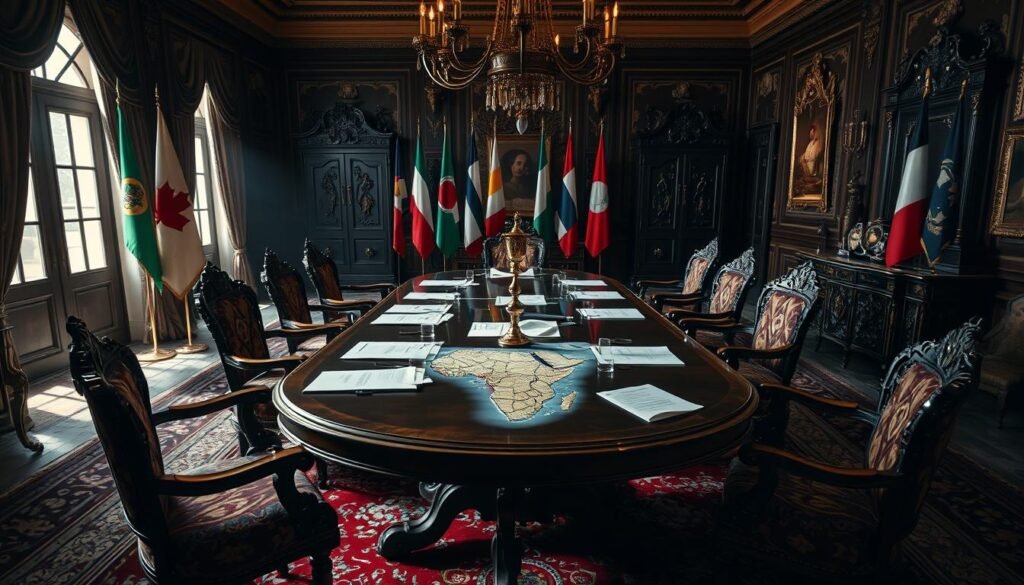
As the world becomes more connected, diplomacy’s role is more important than ever. By exploring the hidden world of international diplomacy, we can understand the power dynamics and secret negotiations that shape our world.
“Diplomacy is the art of telling people to go to hell in such a way that they ask for directions.”
Environmental Cover-ups on an International Scale
The world is facing a severe environmental crisis. It’s vital to expose the truth about global governance and environmental cover-ups. Our planet is under attack, but some powerful groups hide the damage8.
In 2023, the Earth’s temperature hit a record high of 1.46°C above pre-industrial levels. Carbon dioxide levels soared past 420 ppm, more than double what they were before the Industrial Revolution8. Food waste is a huge problem, with a third of all food meant for eating going to waste. This waste could feed 3 billion people and is a major contributor to greenhouse gas emissions8.
The crisis goes beyond food and emissions. Between 1970 and 2016, mammal, fish, bird, reptile, and amphibian populations dropped by 68% on average. Plastic waste is a massive issue, with 300 million tonnes generated globally each year. About 14 million tons of this waste ends up in oceans annually, a number expected to rise to 600 million tons by 20408. The Amazon rainforest, our planet’s lungs, is being cleared at an alarming rate, with an area the size of 300 football fields being cut down every hour8.
These numbers paint a dire picture, but the real extent of environmental damage is often hidden in international politics9. The last decade was the hottest on record, leading to more extreme weather events. These disasters not only harm local communities but also destabilize the world, as seen in 8 out of 10 countries hosting major peace operations in 2018 being highly exposed to climate change9.
Slow Response
We need urgent action, but the world’s response has been slow and blocked by powerful interests. The United Nations is calling on companies, cities, and financial institutions to make credible plans to reduce carbon emissions. Yet, environmental cover-ups on a global scale are slowing our progress toward a sustainable future9.
| Environmental Threat | Global Impact |
|---|---|
| Deforestation | Forests are being depleted at the rate of an area the size of 300 football fields every hour. Brazil, the Democratic Republic of Congo, and Indonesia are the countries with the highest levels of deforestation, with Brazil’s Amazon forest experiencing legal deforestation at a rate of 1.5 million hectares per year8. |
| Biodiversity Loss | Population sizes of mammals, fish, birds, reptiles, and amphibians have declined by an average of 68% between 1970 and 20168. |
| Plastic Pollution | Annual plastic waste generation globally stands at 300 million tonnes, with approximately 14 million tons making its way into oceans each year. If current trends continue, the amount of plastic in the ocean could reach 600 million tons by 20408. |
| Climate-related Conflicts | A study by the Stockholm International Peace Research Institute indicated that areas highly exposed to climate change experience increased conflict risks9. |
It’s time to face the global governance challenges that allow environmental cover-ups. We must demand transparency and accountability from those who are supposed to protect our planet10. Only then can we tackle the pressing environmental issues threatening our future.
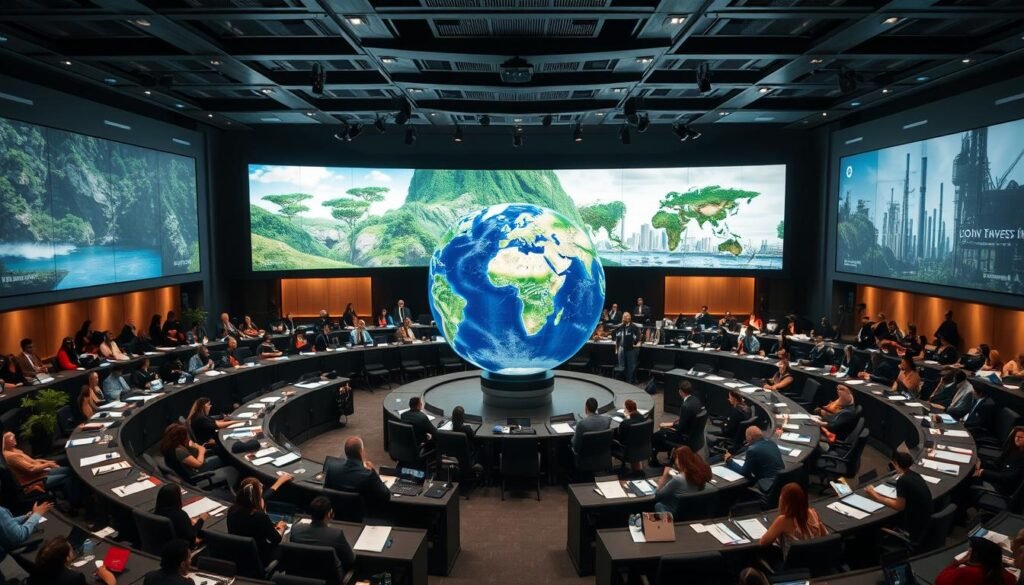
The Secret History of International Aid Programs
International aid programs are often seen as a positive force. They aim to reduce poverty, support development, and enhance lives globally. Yet, the real story behind these efforts is often hidden, with secret motives and corruption present11.
Hidden Agendas in Humanitarian Assistance
Many aid programs claim to help, but the truth is more nuanced. Some groups use aid to advance their own political or economic goals. This means resources are sometimes diverted from those who really need them11. Aid can be used to push certain ideologies, support governments, or gain strategic advantages in key regions.
The True Cost of Global Development Projects
Billions of dollars are spent on global development projects, but there’s a hidden cost. These initiatives often face budget overruns, poor management, and fail to meet their promises11. The real expenses, both financial and in terms of community impact, are often hidden from the public.
Corruption in Aid Distribution Systems
Corruption has tainted the way international aid is given out. Money meant for the needy often ends up in the wrong hands, with little oversight or openness12. This corruption weakens aid programs and deprives those in need of critical support.
Exploring the secret history of international aid reveals a darker side. By exposing hidden agendas, true costs, and corruption, we can strive for a more transparent and effective aid system1112.
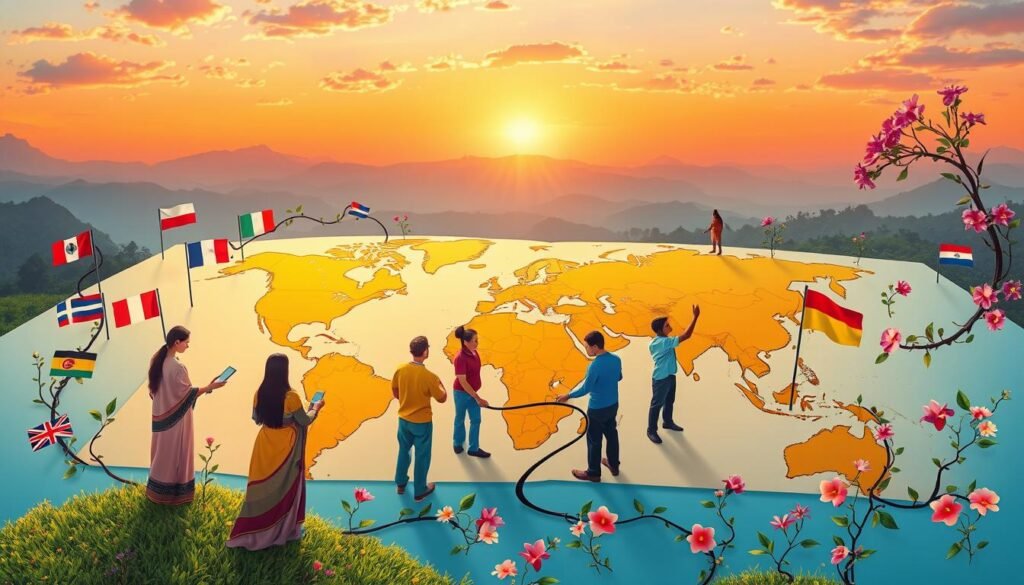
Untold Stories of Cross-Border Security Operations
In the world of international security, teamwork across borders is often unseen. Yet, the stories of these collaborations show a complex and changing scene. Here, law enforcement from different countries works hard to protect our communities13.
Recently, there’s been a big fight against undocumented migrants. The number of illegal crossings has dropped by 78% from its peak in December. This is lower than before the last administration13. But, the challenges are big. The U.S. asylum system, based on old laws, can’t keep up with today’s world. This has led to a huge backlog in immigration courts13.
Biden Administration Solutions
The Biden administration has made big moves to tackle these problems. They’ve proposed a security bill in the Senate. This bill would make many of the president’s strict measures into law13. It includes $20 billion for more border agents, judges, and technology to find fentanyl13.
On the international side, there’s a worrying trend. The number of people on the terrorist watch list caught by the U.S. Border Patrol has gone up. In 2023, it was 172, up from just a few in the past14. Groups like Al Qaeda and ISIS see the U.S. border as weak. More people from different countries are crossing illegally14.
These stories show how important working together across borders is. They also show the ongoing efforts to face new security challenges. It’s clear that teamwork and good policies are key to keeping our communities safe and our borders secure1314.,
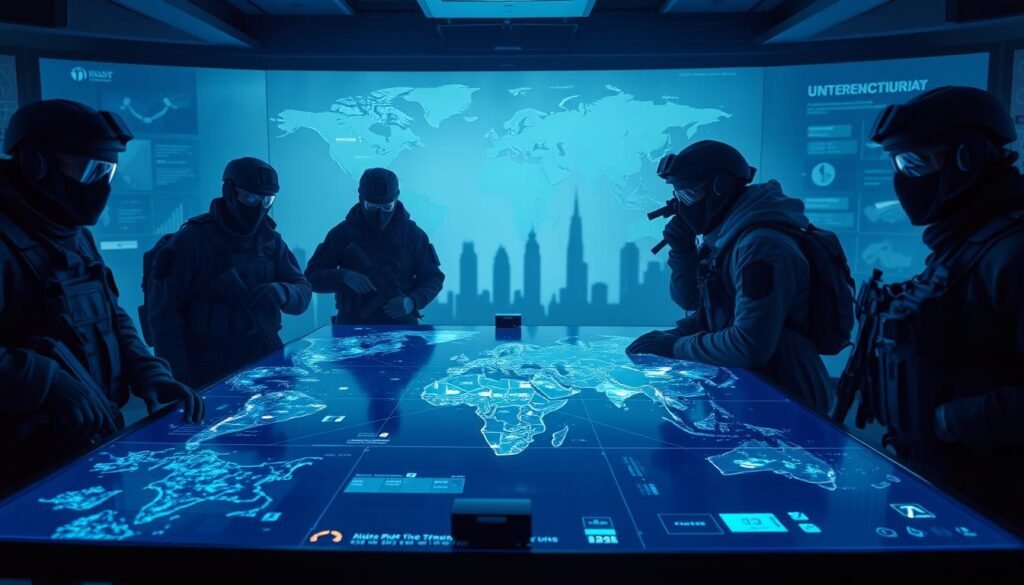
| Metric | Value |
|---|---|
| Reduction in unlawful border crossings from December | 78% |
| Increase in individuals on the terrorist watch list encountered by U.S. Border Patrol (from Trump to FY2023) | From single digits to 172 |
| Increase in proportion of encounters involving someone on the terrorist watch list | From 0.0007% to 0.008% |
| Increase in Al Qaeda’s core membership (from 2001 to 2018) | Approximately tenfold |
“The dismantlement of the largest ISIS online propaganda network and infrastructure in the world was announced by the FBI with the coordination of European partners.”14
The Hidden Impact of Global Trade Agreements
The world is getting more connected, and trade agreements have a big impact. They’re not just about tariffs and market access. There’s a hidden world of corporate power, secret clauses, and economic tactics that affect global trade15.
Secret Clauses in International Treaties
Many trade agreements are secret, with hidden clauses that can change everything. These secret parts, made in private talks, give big companies a lot of power. They can challenge laws that get in the way of their profits15.
Corporate Influence on Trade Policies
Big companies have a big say in trade policies. They use their power to shape deals that help them, not everyone else15.
Economic Warfare Through Trade Deals
In a competitive world, some countries use trade deals as a weapon. They put up barriers like data rules or import policies. This blocks the flow of goods and information, hurting the global economy15.
| Key Findings | 2023 | 2024 |
|---|---|---|
| Data localization requirements highlighted in NTE Report | 17 | 3 |
| Definition of trade barriers in NTE Report | Broader | Focused on measures impeding international exchange |
| U.S. support for trade agreements promoting free cross-border data flows | Present | Withdrawn |
The U.S. Trade Representative’s (USTR) views have changed, as seen in the National Trade Estimate (NTE) Report. This change shows a move towards local rules and self-sufficiency15. It fits with the Biden plan to fix U.S. supply chains and make things locally. This aims to reduce foreign dependence and control data flows for security and fairness15.
Understanding the hidden forces in global trade is key. By exposing corporate power, secret clauses, and economic tactics, we can improve global affairs. We should push for policies that help everyone, not just a few15.
“The shifts in USTR’s approach reflect a broader trend of the U.S. shifting towards a trade policy emphasising local requirements and self-sufficiency, impacting global trade liberalisation efforts.”
Classified Military Operations That Shaped Global Politics
The world of international security is full of secrets. Classified military operations have greatly influenced global politics16. For example, the Global War on Terror started after 9/11. It led to big changes in Afghanistan and Iraq16.
The U.S. has been involved in almost 400 military actions from 1776 to 202317. Over 25% of these happened after the Cold War17. These secret missions have been everywhere, from fighting pirates to helping in Latin America17.
At the center of these secret operations is the fight against terrorism18. The U.S. has a strict way of dealing with terrorist groups. Groups like al-Qa’ida and ETA have been on and off the list18.
These secret actions have changed the world a lot18. Exploring these secret missions, we find stories that have shaped history and affect global politics today.
Thanks to sources like161718, we get a peek into the secret world of security. We learn about the laws, timelines, and effects of these secret military actions. As security issues evolve, we’ll use these lessons to guide global affairs.
International Human Rights Violations: The Untold Truth
The world faces a harsh reality of human rights abuses, but many are hidden from us. We must face the truth that global rules have not stopped these crimes19.
The UN Working Group on Enforced or Involuntary Disappearances has seen over 50,000 cases worldwide19. The International Convention for the Protection of all Persons from Enforced Disappearances shows the world’s acknowledgment of this serious issue19.
But, the world’s response has been weak. The UN encourages countries to set up special courts or truth commissions to deal with these crimes19.
Human Rights Remedies
The Human Rights Council also points out the link between truth and justice, and the need for fair remedies19.
- The UN aims to teach governments how forensic genetics can help meet human rights standards19.
- The Council emphasizes the need for international help to close technology gaps and train countries19.
- It suggests guidelines for missing person databases, covering how to use the data and protect privacy19.
Kathryn Sikkink’s work shows a shift towards holding people accountable for human rights crimes20. This “justice cascade” has led to more trials for human rights abuses, seen as a step forward20.
| Key Findings | Details |
|---|---|
| Nexus between human rights and international peace | The study on Universal Human Rights and the threat to international peace and security found that human rights violations were identified as a threat to international peace and security, and the international community is legally obligated to intervene21. |
| Universality of human rights | The thesis emphasized the universality of human rights, arguing against the doctrine of state sovereignty and cultural relativism, and asserting that the abuse of human rights negates the principles of self-determination and state sovereignty21. |
| Rise in criminal prosecutions | The turn to criminal prosecution of human rights violations, referred to as the “justice cascade” by Kathryn Sikkink, has been viewed positively within the human rights movement20. |
As we explore the complex issue of international human rights abuses, we see a failure in global leadership. We need a new commitment to openness, accountability, and protecting human rights everywhere192120.
“The abuse of human rights is a threat to international peace and security, and the international community is legally obligated to intervene.”
Conclusion: The Future of Global Affairs Transparency
The world of global affairs is much more complex and hidden than we thought. Secrets in international intelligence and dark money in politics have long been hidden22. These secrets have made it hard to understand international relations.
But, things are changing. People want more openness and honesty in how the world is run. Organizations that work with governments are being watched more closely. Issues like human rights and environmental problems are being exposed2324.
We need to keep pushing for more openness in global affairs. We should support whistleblowers, grow investigative journalism, and improve checks on international groups. By revealing the secrets that shape our world, we can work towards a fairer and better future for everyone222324.
FAQ
What are the shocking revelations in global affairs that this article explores?
What sources does the article draw from to uncover these hidden stories?
What are some of the key revelations about the influence of dark money on global affairs/politics?
What insights does the article provide into classified diplomatic communications and their impact on global affairs?
How does the article uncover hidden aspects of international aid programs?
What revelations does the article make about the hidden impact of global trade agreements?
How does the article uncover hidden human rights violations on an international scale?
Source Links
- Behind the Mask: Untold stories of hockey’s legendary goalies | Watch News Videos Online
- Inside the secret world of U.S. intelligence
- International Law and Intelligence Gathering: Mind the Gaps – Lieber Institute West Point
- Review — Dark Money: The Hidden History of the Billionaires Behind the Rise of the Radical Right
- Intelligence and Diplomacy: A New Model for a New Era – United States Department of State
- Overview of the Diplomatic Landscape
- The Biggest Environmental Problems Of 2021
- Climate Change ‘Biggest Threat Modern Humans Have Ever Faced’, World-Renowned Naturalist Tells Security Council, Calls for Greater Global Cooperation
- Standing firm: The Land and Environmental Defenders on the frontlines of the climate crisis | Global Witness
- Britannica Money
- USAID History | About Us | U.S. Agency for International Development
- The Real Choice on Immigration
- Are terrorists slipping across the US border? What the evidence shows.
- The Trade Winds Are Turning: Insights into the 2024 National Trade Estimate
- Global War on Terror | George W. Bush Library
- Foreign interventions by the United States
- Foreign Terrorist Organizations – United States Department of State
- International Day for the Right to the Truth Concerning Gross Human Rights Violations and for the Dignity of Victims
- Anti-Impunity and the Turn to Criminal Law in Human Rights
- Universal Human Rights and Threat to International Peace and Security: The United Nations’ Obligation to Intervene
- Transforming Global Affairs Canada – Discussion paper (June 2023)
- Global Affairs Canada: Departmental Plan 2023-24
- The World in 2024: ten issues that will shape the international agenda
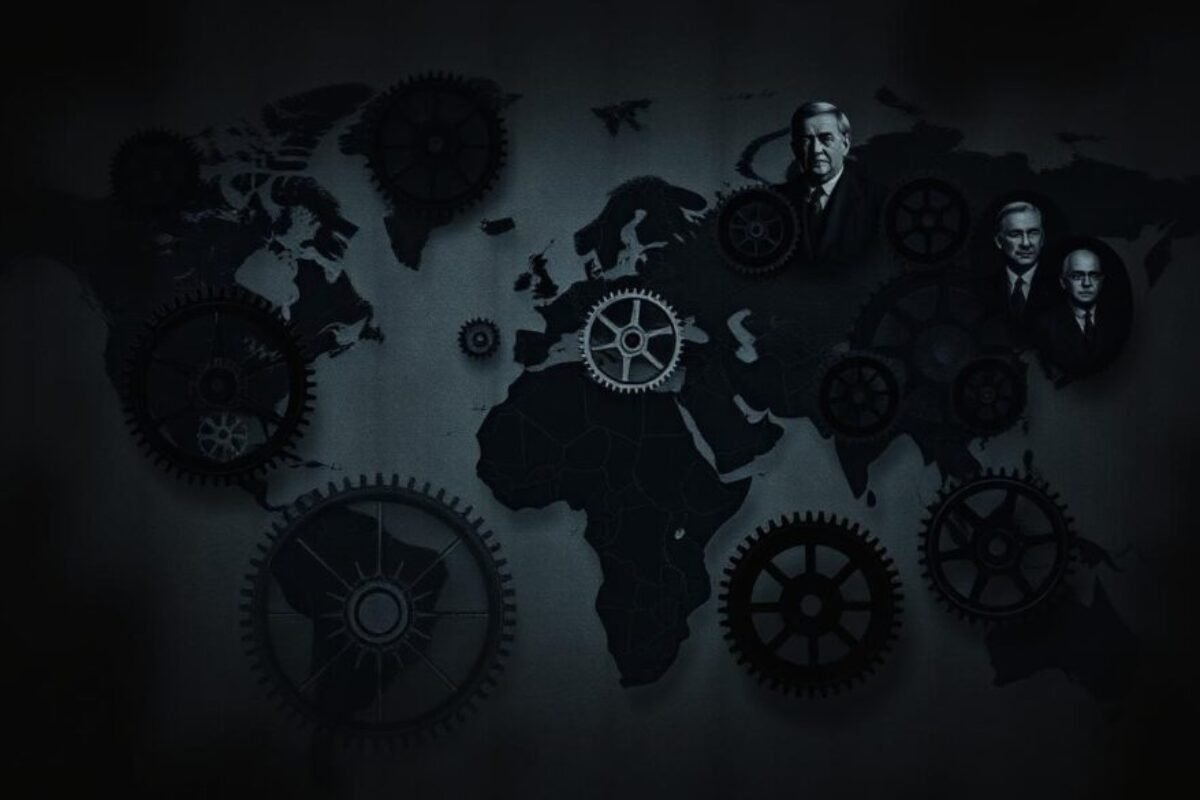




February 27, 2025 @ 7:58 am
Thanks for sharing. I read many of your blog posts, cool, your blog is very good.
March 13, 2025 @ 10:10 am
Your point of view caught my eye and was very interesting. Thanks. I have a question for you.
April 5, 2025 @ 10:10 am
Your article helped me a lot, is there any more related content? Thanks!
June 28, 2025 @ 3:44 am
I don’t think the title of your article matches the content lol. Just kidding, mainly because I had some doubts after reading the article.
June 28, 2025 @ 7:58 pm
Your article helped me a lot, is there any more related content? Thanks!
August 15, 2025 @ 3:29 pm
Your point of view caught my eye and was very interesting. Thanks. I have a question for you.
August 23, 2025 @ 6:50 pm
Can you be more specific about the content of your article? After reading it, I still have some doubts. Hope you can help me. https://accounts.binance.com/register?ref=P9L9FQKY